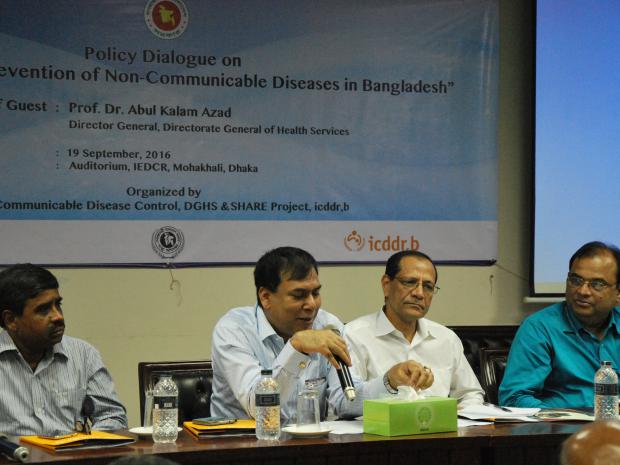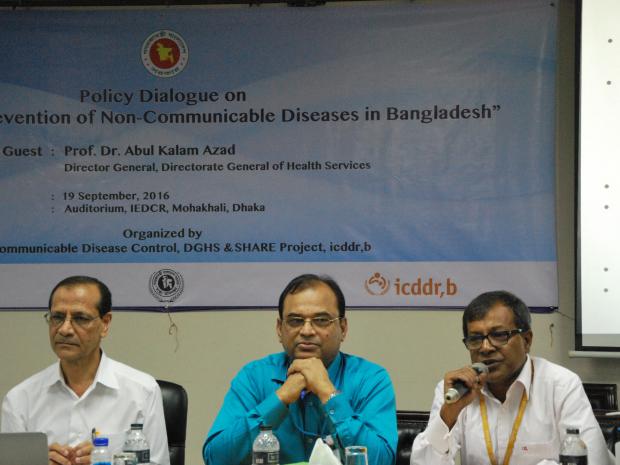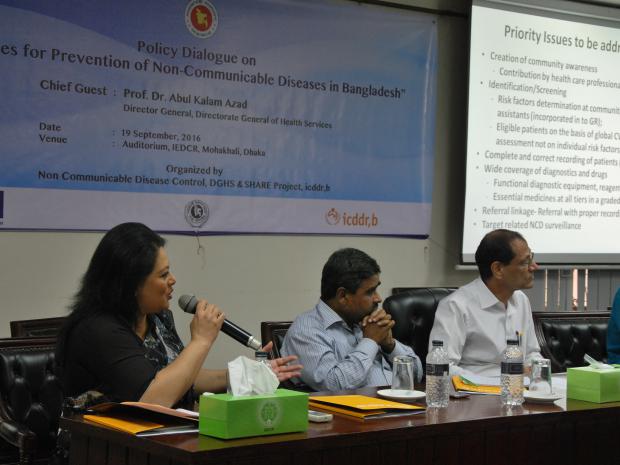Policy Dialogue Steers Commitment for Prevention of NCDs in Bangladesh
14 November is marked as World Diabetes Day. The activities and materials of World Diabetes Day 2016 are focused on promoting the importance of screening to ensure early diagnosis of diabetes, and treatment to reduce the risk of serious complications. According to the International Diabetes Federation (IDF), one in two people with diabetes remain

undiagnosed, and this undiagnosed condition makes them particularly at risk for complications, causing substantial disability and premature death. Diabetes has become a major global public health issue, leading to serious health outcomes like blindness, cardiovascular disease, kidney failure and lower-limb amputation in many countries. The IDF estimates that 415 million adults were living with diabetes in 2015, and this number is anticipated to increase to around 642 million (or one in ten adults) by 2040. Globally, non-communicable diseases (NCDs) like diabetes and cardiovascular disease are the single biggest cause of death now. Global leaders have already signed up to an historic commitment to reduce premature deaths from diabetes and other NCDs by 25% by 2025.
Bangladesh’s National Health Policy also acknowledges the high prevalence of NCDs and calls attention to awareness raising and lifestyle changes to prevent NCDs. Around 68% of deaths in Bangladesh are due to NCDs and other chronic health conditions. In this context, a policy dialogue entitled ‘Strategies for Prevention of Non-communicable Diseases in Bangladesh’ was organized on 19th September 2016 at the IEDCR auditorium by Non Communicable Disease Control (NCDC), Directorate General of Health Services (DGHS) and the European Union supported SHARE (Strengthening Health, Applying Research Evidence) project of icddr,b involving all key stakeholders, to stimulate commitment to supporting and strengthening the implementation of the operational plans. Prof. Dr. Abul Kalam Azad, Director General of DGHS attended the event as the Chief Guest and Dr. Omar Ali Sarker, WHO, Programme Manager, NCDC, DGHS chaired the session. Dr. Mostafa Zaman, National NCD Coordinator, WHO was present as the special guest. Prof. M A Faiz, ex-Director General of DGHS moderated the event and delivered a presentation on ‘Strategies for Prevention and Control of Non-communicable Diseases’, following a presentation titled ‘Overview of the current scenario of NCDs’ by Dr. Aliya Naheed, Head of Initiative for Non Communicable Diseases, icddr,b.

Key focus
The objective of this dialogue was to identify the gaps and opportunities in the health systems to strengthen the services for NCDs prevention in Bangladesh. Key presentations highlighted how NCDs are responsible for a considerable portion of mortality in Bangladesh and globally. Discussants of the policy dialogue talked about existing health programmes related to NCDs in Bangladesh and recommended key priorities to help develop sector plans to address the NCDs burden. They highlighted the importance of having nationally representative surveillance data about the prevalence of NCDs and associated risk factors.
Referring to the huge economic burden due to NCDs, Prof. Dr. Abul Kalam Azad mentioned primary health care as the main area to address NCDs prevention. Prof. Azad pointed out that the policy dialogue on NCDs prevention carries special significance on the eve of developing operational plans of new sector programme. He said it is also imperative to keep the impact of natural disasters and climate change issues in consideration. He regretfully mentioned inadequate space under the essential service package (ESP) of sector plan dedicated for NCDs prevention. While talking about revisiting the ESP, he said that an ambulance service will be included in the future. ‘We need to invest more on NCDs prevention through community clinics at primary health care level’, he mentioned.
As recommended by the Sustainable Development Goals (SDGs), Bangladesh will collect data and provide yearly reporting. Individual and community level data on NCDs should be in place at the primary health care level. Considering limited resources, results-based financing may be another way out, Prof. Azad said. More budget allocation is needed in NCDs prevention, especially in capacity building areas at the national level. According to Prof. Azad, disaster management should have been removed from NCDs prevention programme, because it is limiting the budget for dedicated NCDs prevention.
Raising awareness on NCDs
Issues of awareness raising on NCDs through schools, medical professionals, community outreach health promoters, religious leaders and traditional campaign programmes were a prominent part of the discussion.School curricula need to incorporate NCDs prevention issues on a large scale. Suggestions included installing NCDs awareness billboards in front

of schools and disseminating awareness messages through school students among society. More activities on awareness raising through community clinics, religious institutions and NCDs prevention messages displayed in different city corners should also be initiated on an urgent basis. Showcasing positive examples by promoting the stories ofhealthy people who have survived NCDs may strengthen awareness-raising programmes. Another important issue is linking awareness to behavior change at both the individual and community level. Alongside the Ministry of Health and Family Welfare, the local government can play a key role in this regard. Unless we create an enabling environment that supports these activities, NCDs prevention cannot occur at the required pace..Discussants also discussed the importance of disincentivizing unhealthy lifestyle choices as a key component of NCDs prevention.
Health facilities to be well-equipped
The policy dialogue recommends that upazila, union and community level health facilities be well-equipped for NCDs screening and risks factor identification. One good suggestion that stemmed from the discussion is selecting a single upazila for risks factors analysis and evidence generation which could act as a model for evidence-informed health policy making on NCDs at the upazila level. Dr. Aliya Naheed highlighted the importance of developing unified record keeping systems and more effective mechanisms for patient referral. She also discussed the importance of sharing best practices on NCDs prevention
Special focus on human resource development
Prof. Azad pointed out the necessity for adequate work force development at the primary health care level and the importance of a holistic approach to prevent NCDs. Dr. A.M. Zakir Hussain, Senior Consultant and ex-Line Director of Primary Health Care, DGHS stressed the importance of policy leadership and commitment for tackling the economic burden generated by NCDs. . He also talked about assigning specific job responsibilities to organize health service delivery in NCDs prevention and treatment. Pointing out the overburdened workload of health assistants or family welfare assistants, he discussed about dedicating the necessary workforce anddemand side initiatives for

NCDs prevention through awareness raising. Dr Khaleda Islam from IEDCR said that the roles and scope of work of different professional groups on NCDs prevention need to be specified. NCDs screening at the health facility level and risk factor identification (which can even occur outside health facilities) can be differentiated in NCDs prevention programme. A clear specification of roles for these two activities is important. For NCDs prevention, we need to keep doctors at Union Health Sub Center for identification, screening and treatment. Considering limited resources, health service delivery should shift from acute care to chronic prevention model. Hypertension detection can be done by non-medical trained staff. Exploring ways to train everyday people to take part in NCDs prevention is an important component of overcoming resource limitations.
Way forward
The sector programme is expected to strengthen community level awareness activities that promote healthy lifestyles and help them to successfully transition to messages focused on behavior change for NCDs prevention. Dr. Iqbal Anwar, Scientist and SHARE Project Director of icddr,b, talked about inter-sectoral coordination to address health problems like NCDs and shared lessons learnt from visiting a community level NCDs prevention programme in Myanmar. According to Dr Anwar, people living in urban slums and floating populations living on streets need special attention for NCDs prevention. Discussants of the policy dialogue set key recommendations and hoped this would benefit the upcoming sector plan. Finally, focal points of NCDC, DGHS reiteratedthat the government would remain steadfast in strengthening community level initiatives and cohesive policy efforts of government and NGOs for NCDs prevention.
